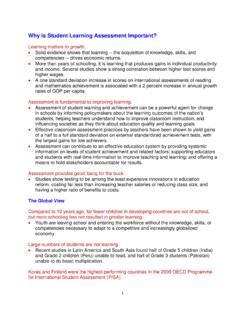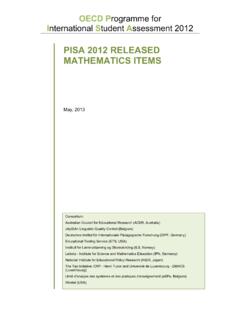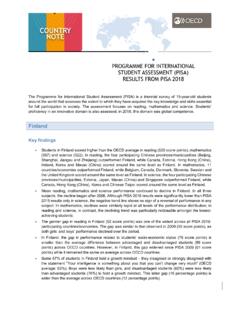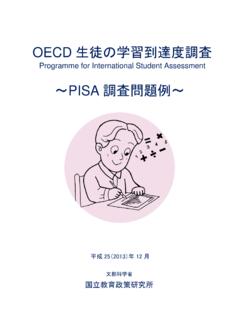Transcription of School Readiness - EY Matters
1 School Readiness A critical review of perspectives and evidence A TACTYC Research Publication by Sue Bingham and David Whitebread School Readiness ; a critical review of perspectives and evidence 2 The Purpose of this Report There has been extensive discussion and reference in recent months to the notion of School Readiness . This review was commissioned by TACTYC in order to examine the perspectives, views and underlying assumptions concerning early childhood education which underpin this notion and its various manifestations. The report is intended to review the emergence and underlying perspectives behind the School Readiness debate and to review research evidence which might inform it.
2 In order to provide the best possible quality evidence , in the main, only studies reported in peer-reviewed journals, with appropriate sample sizes and published since 2000 have been included. TACTYC 2012. Contents Page 4 Executive Summary Page 8 Introduction: School Readiness : getting who ready for what? Page 15 Part 1: A critical review of approaches to and definitions of School Readiness Page 16 Recent use of the term School Readiness and the associated concepts it embodies within policy-setting in England Page 21 Policy in relation to early childhood, 1930-2011; interventions and rationale Page 25 OECD s assessment of early years policy within England as Schoolification Page 29 Effects of policy on early years education and School Readiness ; the early years educationalists perspective Page 35 Early Years pedagogy School Readiness .
3 A critical review of perspectives and evidence 3 Page 40 The dilemma facing early years educationalists Page 43 What next for School Readiness ? Page 47 Part 2: A critical review of the evidence Page 51 Part What have we learned from developmental research? Page 71 Part The diversity of children s early life experiences Page 88 Part Starting School ; children encountering transitions, curricula and pedagogies Page 118 Part The essential ingredients of a pedagogy for early childhood Page 150 References School Readiness ; a critical review of perspectives and evidence 4 Executive Summary The well-aired arguments about whether, how and why a child should be made ready for School in England are symptomatic of the far deeper tension growing within the early years education sector in relation to a widening conceptual divide.
4 There is no agreement upon a definition of the term School Readiness or Readiness for School and its use because there is no agreement upon what young children should be prepared for; in essence, the disagreement about terminology and definition encapsulates a fundamental difference in conception of the purpose of early years education. The English government in particular has become increasingly interventionist. In 2011 it brought out a set of documents prescribing a curriculum-centred approach for the Foundation Stage and has considered assessment testing of School Readiness in children.
5 The government uses the term Readiness for School as a finite construct, implying there should be a fixed standard of physical, intellectual, and social development that prepares children to meet School requirements and assimilate curriculum, typically embracing specific cognitive and linguistic skills. This is in line with its attempts to raise standards. The government has encouraged the introduction of formal curricula at ever-earlier points in School for example, it has imposed a systematic programme for phonics teaching in Reception classes and has emphasised delivery of aspects of the National Literacy and Numeracy Strategies.
6 The model of Readiness for School is attractive to governments as it seemingly delivers children into primary School ready conform to classroom procedures and even able to perform basic reading and writing skills. This takes little heed of individual differences or the fact that many children at aged four-years are simply not developmentally for this type of learning and may well be deemed failures at a very early age. Key Stage testing at the end of year 2 continues to pressurize teachers to push children towards achieving ever higher levels and to start teaching to these tests at School Readiness ; a critical review of perspectives and evidence 5 ever earlier points.
7 Teachers are relying increasingly on formal, didactic methods of instruction to achieve these targets partly due to having large classes and inadequate adult-child ratios in Reception classes. Numerous indicators highlight the substantial differences in early childhood experiences across children entering School in England. These differences affect children s initial development and persist as they grow older, influencing dispositions towards learning as well as the range of skills they will be ready to employ upon arrival in School . Such factors include, for example, the nature of early relationships with parents and other caregivers, the extent of cognitive stimulation, and access to adequate nutrition, health care, and other resources such as a safe home and neighbourhood environment.
8 Irrespective of their backgrounds, currently young children are being measured against a fixed yardstick of Readiness . This approach leads to many children being labelled as being in some way deficient and impedes teachers abilities to see the child s potential. Summer-born children are particularly at risk of this early labelling . Evidence from a variety of sources reveals that this earlier is better approach in relation to children in the early years is misguided, does not lead to improved outcomes in the long term and, indeed, can have harmful short- and long-term consequences.
9 This evidence comes from developmental and cognitive neuroscience and psychology, as well as from studies into the characteristics of high-quality international pre- School provision and approaches based upon the model of social pedagogy. The social pedagogy model underpins early childhood education provision in many European countries and appears to more beneficially support children s development as learners and emotionally well-adjusted citizens than the earlier is better approach in the UK. This is not surprising, as current research into early emotional and cognitive development suggests that long-term well-being and success at School are most powerfully supported, not by early introduction of academic content, but by children s developing executive functioning and self-regulation abilities, and by the satisfaction of their needs for feelings of autonomy, competence and relatedness.
10 The focus on these developmental processes School Readiness ; a critical review of perspectives and evidence 6 incorporated within the social pedagogy approach is clearly a major contributory factor in the comparative success of early education provision in many other European countries. All children, at all ages, are ready to learn and have been doing so since birth. Recent research using new techniques in cognitive neuroscience and developmental psychology has established that many of our cognitive processes are there and fully functioning at birth, or mature very quickly during the first 4-5 years of life.



